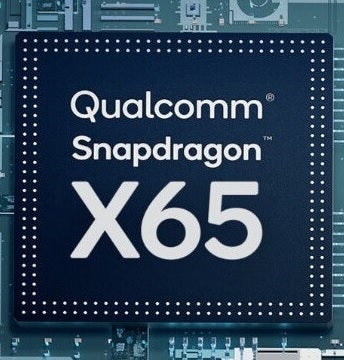Apple had originally hoped to have its own modem chip debut in the 2023 iPhone models
Just a few days before that report, the Supreme Court refused to hear Apple’s plea to have a couple of Qualcomm patents invalidated. Putting two and two together, we can conclude-thanks to the magic of hindsight-that these were the two patents that Apple would have infringed on had they used their own iPhone modem chip. So thanks to the patents, Qualcomm will contribute its modem chips to 100% of iPhone units next year instead of the 20% it would have had otherwise.

The iPhone 14 series uses the Qualcomm Snapdragon X65 modem
The Broadcom chip that Apple is also looking to replace handles Wi-Fi and Bluetooth connectivity on Apple devices. To reiterate, Apple is aiming to debut this chip in 2025. A follow-up version of this chip could add a modem allowing a single chip to handle cellular, Wi-Fi, and Bluetooth on a product like the iPhone. This would be bad news for Broadcom since the iPhone generated half of the chipmaker’s $394.3 billion in revenue last year. During its earnings calls, Broadcomm refers to Apple as its “large North American customer.”
Broadcom CEO Hock Tan might be whistling past the graveyard but he remained optimistic about his company continuing to supply Apple. “We believe we have the best technology and delivering value to our customers,” he said. “There’s no reason to find something else where you’re not the best.”
So what does Qualcomm have to say about possibly seeing the share of iPhone units using its modem drop from 100% to 20%? Back in November, the San Diego-based firm said that it expected to supply the vast majority of 2023 iPhone handsets with its modem chips. As for 2024 and beyond, Qualcomm stated, “Beyond this, there are no changes to our planning assumption, and we are assuming minimal contribution from Apple product revenues in fiscal ’25.”
Tim Cook explains why Apple didn’t like Qualcomm before their settlement
If Apple gets its way, it sounds like there will be two companies shocked and stunned in 2025 with Broadcom and Qualcomm having to explain to stockholders why they didn’t take the threat from Apple seriously. On the other hand, if Apple fails to produce compelling replacements for the parts it sources from Broadcom and Qualcomm, iPhone users will not be happy.
Apple might be looking to save money while having more control over the designs used in the chips it buys from Broadcom and Qualcomm. But more importantly, Apple truly believes that it can build better components than the silicon it is now purchasing from the two companies.
Stay connected with us on social media platform for instant update click here to join our Twitter, & Facebook
We are now on Telegram. Click here to join our channel (@TechiUpdate) and stay updated with the latest Technology headlines.
For all the latest Technology News Click Here
